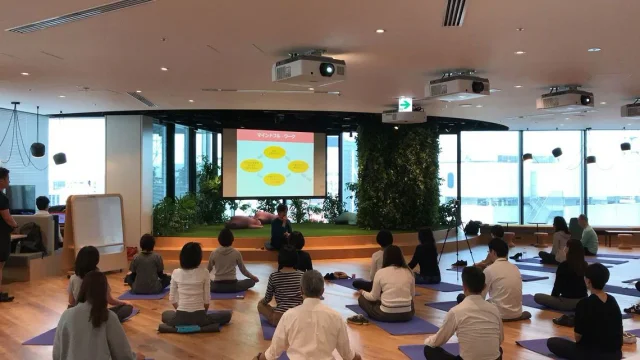
マインドフルネスのセミナーを受ける東急不動産HDのグループ社員。研修の一環としてマインドフルネスを導入する企業が増えている (写真:東急不動産HD)
「今、この瞬間に注意を向ける」――。マインドフルネスが今、長引くコロナ禍で注目されている
『週刊東洋経済』(2月22日発売号)では、「脱・ストレス」を特集。ストレスの発生・解消に密接に関係する4大要素「脳」「睡眠」「運動」「食事」の見直し方や整え方を扱う。フィジカルトレーナーの中野ジェームズ修一氏や、精神科医の樺沢紫苑氏、スタンフォード大学医学部の西野精治教授など各分野のエキスパートが教えるコンディショニング術でストレスフリーな状態の実現を目指す。
マインドフルネスは、自分の感情に気付き、あるがままの状態を受け入れる活動で、ストレスを減らすことができる。生産性向上にもつながることから研修を設定する企業も増えている。だが、「マインドフルネスは何となくとっつきにくい」と思う人も少なくない。本当に効果があるのか、脳科学を専門にする医師や、研修を行っている企業やその講師に話を聞いた。
ストレスの捉え方を変え、コンディションを整える
1月下旬、ソニーグループのインターネット広告会社、SMNが中途採用者を対象にしたオンライン交流会を開催した。コロナの影響で採用面接はオンラインで行われ、入社直後から在宅勤務が続く。そうした人と会えないストレス減らそうと、交流会の中で企画したメニューが、マインドフルネスの実践だ。
「呼吸に注意を向けて、3分間すごしてみましょう」。講師の中村悟氏がこう語りかけた。中村氏が手にする鐘の合図で参加者が瞑想を始める。筆者もやってみたが、すぐに締め切り間近の原稿や、外を走る自動車の音が気になってしまった。
中村氏は「気がそれるのは悪いことではない。『あ、気が散っているな』と気が付いたらまた呼吸に注意を戻せばいい」と説明する。この呼吸法を繰り返すことで、意識を「今」に集中させることができる。
食べることに意識を向けるセッションもあった。まずは目の前の食べ物を眺めたり香りを感じたりする。口に入れてからもとにかくゆっくりと味わう。ナッツやチョコという人が多かったが、中には集中して回鍋肉(ホイコーロー)を味わう人もいた。参加者からは「心を整えることの大切さを感じることができた」などの感想が寄せられた。
中村氏は、昨年までヤフーの社員で、同社にマインドフルネスを導入した実績の持ち主。2016年から始めたオリジナルのプログラムは、延べ2500人超が受講したという。独立した今は、カルビーなど大手企業を中心に研修を行っている。
中村氏はマインドフルネスを「ストレスに対する捉え方を変えることよって、コンディションが整うメソッド」と説明する。
では、マインドフルネスはビジネスの場でどんな効果をもたらすのか。
名刺管理サービスのSansanは2017年からマインドフルネス研修を導入。同社では瞑想に加えて、「ジャーナリング」という与えられたテーマについて、心の中をひたすら書き出す作業も行う。2人1組になり、書いたものを見せ合うが評価や判断はしない。自分でも認識していない価値観に気付くことが狙いだ。
人事部の我妻小夜子副部長は「カッとなりやすかった上司が、部下と落ち着いて話せるようになったという報告がある」と説明する。我妻副部長自身も、仕事で突発的なことが起こった時に、「自分が動揺しているな」と気が付くことができるようになった。一拍置いて次の行動に移ることで、落ち着いて仕事に取り組めるという。
脳の過剰な活動を抑え、疲れを和らげる
大手企業やスタートアップが次々とマインドフルネスを取り入れるのは、脳科学から見ても有効とされているからだ。「マインドフルネスは、脳の過剰な活動を抑え、疲れを和らげる。続けることで脳の構造に変化が起き、記憶や集中の部位が強化される」。アメリカのイェール大学で脳科学を研究し、ロサンゼルスでクリニックを開業する精神科医、久賀谷亮氏がこう説明する。
脳の過剰な活動とはどういうことだろうか。私たちがぼーっとしていても脳は活動している。無意識の活動に使われているのが「デフォルト・モード・ネットワーク(DMN)」という脳の回路だ。自動車のアイドリングをイメージしてほしい。
瞑想はこのDMNの活動を抑えることができる科学的に正しい脳の休ませ方だという。また、理性や感情を司る脳のバランスが良くなり、不安や怒りといったネガティブな感情も抑制できる。久賀谷氏は「コロナ禍で不安を感じる今こそ、マインドフルネスは有効な手段」と話す。
マインドフルネスの本場、アメリカではすでに1000億円に市場が拡大している。ニューヨークなどの都市部には瞑想するためのメディテーションスタジオも多く、全米では約2500カ所を超える。
久賀谷氏によると、アメリカでマインドフルネスがブームになったのは2007年ごろ。アメリカのグーグルが導入し、「SIY(サーチ・インサイド・ユアセルフ)」という独自のプログラムを作ったことで一気に広がった。これは体を整え、自分自身を認識することを主眼に置いたものだ。関連の書籍が数多く出版されている。
コロナ禍の今、グーグルはどんなプログラムを行っているのだろうか。グーグル本社に聞くと「コロナ禍でのストレスや不安からの回復力(レジリエンス)を育む、オンライントレーニングを行っている」と回答があった。アスリートや心理学者が解説する動画を定期的に配信しているという。
元社員やマインドフルネスの専門家によると、少し前のグーグルでは2つのプログラムが行われていた。1つは前述のSIYで、数日間の日程で行われ、何のために生きるのかなど根源的なテーマを深堀りするものだ。
もう1つは体、感情、集中、精神の4つのエネルギーを適切に使えるようにするプログラム。瞑想や食事を取ることだけに集中する時間をつくる。2つのプログラムとも社員が講師になり、勤務時間内に行われていた。5年前までグーグルに在籍し、コンサルティング会社代表のピョートル・フェリクス・グジバチ氏は「選考を通らなければ参加できないプログラムがあるほど人気があった」と振り返る。
生産性の向上にも寄与
グーグルだけではない。限られた時間の中で最大限のパフォーマンスを発揮できるとして、フェイスブックやシスコ、パタゴニアなどの大手企業などが導入し、「数年前の時点でアメリカ企業の56%が取り入れている」(久賀谷氏)。
具体的な数値での成果も報告されている。アメリカの医療保険会社エトナは、マインドフルネスを取り入れる前と後で従業員にアンケートした。導入後に「ストレスを感じている」と回答した人は、導入前に比べて3分の1に減った。すべてがマインドフルネスを導入したからとは言えないが、1人あたりの生産性も年間約3000ドル向上したという。
日本では導入企業が増えてはいるが、アメリカに比べればマインドフルネスの認知度自体、まだまだ低い。今回取材した久賀谷氏と中村氏らが共通して強調したことがある。
それはマインドフルネスを宗教的なものと切り離して考えることだ。アメリカではヨガと同じで「ちょっとイケてるもの」として受け入れられやすい。一方、日本では瞑想から仏教とつながっているものと捉える向きがあるという。そうした固定観念を振り払うこともマインドフルネスを試す第一歩かもしれない。

コロナ禍でストレスフルな状況が続く中、マインドフルネスがストレス低減の一助になるだろう。
meditation
A group employee of Tokyu Fudosan HD taking a seminar on mindfulness. An increasing number of companies are introducing mindfulness as part of their training (Photo: Tokyu Fudosan HD)
"Now, pay attention to this moment." Mindfulness is now attracting attention for its protracted corona sickness
"Weekly Toyo Keizai" (issued on February 22nd) features "de-stress". It deals with how to review and arrange the four major elements "brain," "sleep," "exercise," and "diet," which are closely related to the generation and elimination of stress. We aim to achieve a stress-free state with conditioning techniques taught by experts in various fields such as physical trainer Shuichi Nakano, psychiatrist Shion Kabasawa, and professor Seiji Nishino of Stanford University School of Medicine.
Mindfulness is an activity that recognizes one's emotions and accepts the state as it is, and can reduce stress. An increasing number of companies are setting up training because it will lead to improved productivity. However, there are many people who think that "mindfulness is somehow difficult to get along with." We talked to doctors who specialize in brain science, companies that are training, and their instructors to see if it really works.
Change the way you perceive stress and adjust your condition
In late January, Sony Group's Internet advertising company SMN held an online exchange event for mid-career hires. Due to the influence of Corona, recruitment interviews are conducted online, and work from home continues immediately after joining the company. The menu planned during the exchange meeting to reduce the stress of not being able to meet such people is the practice of mindfulness.
"Let's pay attention to breathing and spend 3 minutes." Mr. Satoru Nakamura, the instructor, said: Participants begin meditation at the signal of the bell that Mr. Nakamura holds. I also tried it, but soon I was worried about the manuscript near the deadline and the sound of the car running outside.
Mr. Nakamura explains, "It's not a bad thing to be distracted. If you realize that you're distracted, you should pay attention to your breathing again." By repeating this breathing method, you can concentrate your consciousness on the "now".
There was also a session that focused on eating. First of all, look at the food in front of you and feel the scent. After putting it in your mouth, taste it slowly. There were many people who called nuts and chocolate, but there were also people who concentrated on tasting Twice-cooked meat (Huikoro). Participants commented, "I was able to feel the importance of preparing my mind."
Mr. Nakamura was an employee of Yahoo until last year and has a track record of introducing mindfulness to the company. The original program, which started in 2016, is said to have been taken by a total of more than 2,500 people. Now that he has become independent, he is conducting training mainly for major companies such as Calbee.
Mr. Nakamura describes mindfulness as "a method of adjusting conditions by changing the way we perceive stress."
So what effect does mindfulness have in the business environment?
Sansan, a business card management service, introduced mindfulness training in 2017. In addition to meditation, the company also writes down the given theme of "journaling" in its heart. They form a pair and show each other what they wrote, but do not evaluate or judge. The aim is to be aware of values that I do not even recognize.
Sayoko Gazuma, deputy director of the Human Resources Department, explains, "There are reports that her boss, who was easy to get angry with her, can now talk calmly with her subordinates." Deputy Director Gatsuma himself became able to realize that "she is upset" when something unexpected happens in her work. She says she can calm down and work by taking a beat and moving on to her next action.
Suppresses excessive brain activity and relieves fatigue
The reason why major companies and startups are adopting mindfulness one after another is that it is effective from the viewpoint of brain science. "Mindfulness suppresses overactivity in the brain and relieves fatigue. Continued changes in the structure of the brain, strengthening areas of memory and concentration." Akira Kugaya, a psychiatrist who studies brain science at Yale University in the United States and opens a clinic in Los Angeles, explains:
What does excessive brain activity mean? The brain is active even when we are vacant. The circuit of the brain called "default mode network (DMN)" is used for unconscious activities. I want you to imagine the idling of a car.
Meditation is a scientifically correct way to rest the brain that can suppress the activity of this DMN. In addition, the balance of the brain that controls reason and emotions is improved, and negative emotions such as anxiety and anger can be suppressed. Mr. Kugaya says, "Mindfulness is an effective means now that we are worried about the corona sickness."
In the United States, the home of mindfulness, the market has already expanded to 100 billion yen. There are many meditation studios for meditation in urban areas such as New York, and there are more than 2,500 meditation studios in the United States.
According to Mr. Kugaya, mindfulness became a boom in the United States around 2007. Introduced by Google in the United States, it spread all at once by creating a unique program called "SIY (Search Inside Yourself)". It focuses on getting in shape and recognizing oneself. Many related books have been published.
What kind of program is Google doing now that the corona is bad? When I asked the Google headquarters, they answered, "We are conducting online training to foster resilience from stress and anxiety caused by corona sickness." It is said that it regularly distributes videos explained by athletes and psychologists.
Some time ago, Google had two programs, according to former employees and mindfulness experts. One is the SIY mentioned above, which takes place over a period of several days and delves into the underlying themes such as what to live for.
The other is a program that allows you to properly use the four energies of body, emotion, concentration, and mind. Make time to focus solely on meditation and eating. In both programs, employees became instructors and were conducted during working hours. "It was so popular that some programs couldn't be attended without passing the selection," said Pyotr Felix Gujibachi, a consulting firm representative who worked for Google five years ago.
Also contributes to improved productivity
It's not just Google. Introduced by major companies such as Facebook, Cisco, Patagonia, etc. as being able to maximize performance in a limited time, "56% of American companies have adopted it as of a few years ago" (Kugaya) Mr).
Results with specific numerical values have also been reported. Etna, an American health insurance company, surveyed employees before and after embracing mindfulness. The number of people who answered that they were "stressed" after the introduction decreased to one-third compared to before the introduction. Not all have introduced mindfulness, but per capita productivity has also increased by about $ 3,000 a year.
Although the number of companies that have introduced it is increasing in Japan, the awareness of mindfulness itself is still low compared to the United States. Mr. Kugaya and Mr. Nakamura, who were interviewed this time, have emphasized in common.
It is to think of mindfulness separately from religious ones. In the United States, it is easy to be accepted as "a little cool" like yoga. On the other hand, in Japan, there is a tendency to think that meditation is connected to Buddhism. Shaking off those stereotypes may be the first step in testing mindfulness.
Mindfulness will help reduce stress as the corona-stricken and stressful situation continues.
The special feature of the February 27 issue of "Weekly Toyo Keizai" (released on February 22) is "De-stress".

【このカテゴリーの最新記事】
-
no image
-
no image
-
no image
-
no image
-
no image








